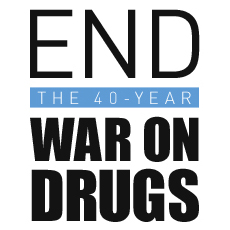
June 2011 marks the 40th anniversary of President Richard Nixon’s declaration of a “war on drugs” — a war that has cost roughly a trillion dollars, has produced little to no effect on the supply of or demand for drugs in the United States, and has contributed to making America the world’s largest incarcerator. Throughout the month, check back daily for posts about the drug war, its victims and what needs to be done to restore fairness and create effective policy.
“Constructive wave interference” describes the phenomena of two different ocean swells coming together and reinforcing each other, leading to the formation of enormous “rogue waves” that capsize even the largest ships.
It is a fitting metaphor to describe the combined effect of two policies that have dominated urban America’s approach to criminal justice in the past several decades — the “war on drugs” and “Broken Windows” policing. Together, their mutually reinforcing effects have led to mass incarceration, widespread civil rights abuses, and severe and disproportionate consequences for America’s youth, with few public safety benefits. New York City sits at the confluence of these costly and punitive approaches. By all indications, many of the city’s residents are drowning.
In 1982, an article in Atlantic Monthly magazine introduced a new theory of law enforcement, known as “Broken Windows” policing. The proponents of Broken Windows policing hypothesized that vigorous enforcement of low-level petty offenses would lead to a reduction in more serious crime. Championed at the national and local level, Broken Windows policing has been enthusiastically embraced by law enforcement throughout the United States, imposing tremendous costs on communities despite a lack of evidence that this approach has contributed to declining crime rates. The New York City Police Department has developed and marketed its own aggressive brand of Broken Windows law enforcement, characterized by driving up arrest numbers at any cost and racially biased “stop-and-frisk” practices where officers stop, question and even search innocent people for no reason at all. In 2010 alone, NYPD officers made over half a million of these suspicionless — and unconstitutional — stops, 85 percent of which targeted people of color. Guns — the ostensible reason for the stop-and-frisk regime — were found in less than 0.2 percent of those stops. Instead, when NYPD officers find anything at all, it is often just a small amount of marijuana.
Since 2002, the NYPD has made more than 350,000 arrests for low-level marijuana offenses, and the numbers continue to climb annually. Eighty-six percent of people arrested for marijuana possession in New York City are black or Latino, even though these groups make up only a quarter of the city’s population and government surveys of people 18 to 25 consistently show that young whites use marijuana more often than young blacks and Latinos. In addition to jail time, these marijuana arrests can result in permanent criminal records, loss of student financial aid, loss of child custody, loss of public housing, deportation and a host of other severe collateral consequences.
In 2007, the New York Civil Liberties Union (NYCLU) issued a report documenting the NYPD’s “marijuana arrest crusade” and the civil rights abuses that pervade these arrests. The fact that NYPD officers jail so many New Yorkers for minor pot possession with such astonishing frequency, despite the fact that almost 35 years ago the New York Legislature reduced the offense from a criminal offense to a violation, speaks to the corrosive effects of “zero-tolerance” approaches that run roughshod over basic constitutional rights and may have little, if anything, to do with improving public safety.
Change is long overdue.
Reversing course on these decades-old policies will require sustained and reform efforts. Nationally, such efforts are being spearheaded by the ACLU’s Safe and Fair campaign. In New York, progress is being made in the courts, in the legislature, and on the streets. In addition to the NYCLU’s 2007 report on the marijuana arrest crusade, the NYCLU recently supported legislation that, if enacted, would significantly curtail NYPD officers’ ability to haul New Yorkers off to jail for possessing a small amounts of marijuana, finally bringing the NYPD’s conduct in line with the Legislature’s intent.
The NYCLU also works to empower New Yorkers with an understanding of basic constitutional rights when they are stopped by NYPD officers. In addition, the NYCLU has sued to obtain information about the NYPD’s stop-and-frisk policy, revealing its disproportionate effects on young black and brown New Yorkers and negligible public safety benefits. Federal courts are currently considering a lawsuit by the Center for Constitutional Rights seeking to put an end to the NYPD’s aggressive stop-and-frisk policies on the street, and NYCLU has filed a lawsuit seeking to end a similar practice in taxi cabs.
The time is right for a fundamental shift in our approach to criminal justice issues in America. We must move away from punitive and costly approaches, and toward effective and fair solutions. Ending the “war on drugs” and the NYPD’s marijuana arrest crusade will be a tremendous start.
Learn more about the war on drugs: Sign up for breaking news alerts, follow us on Twitter, and like us on Facebook.


